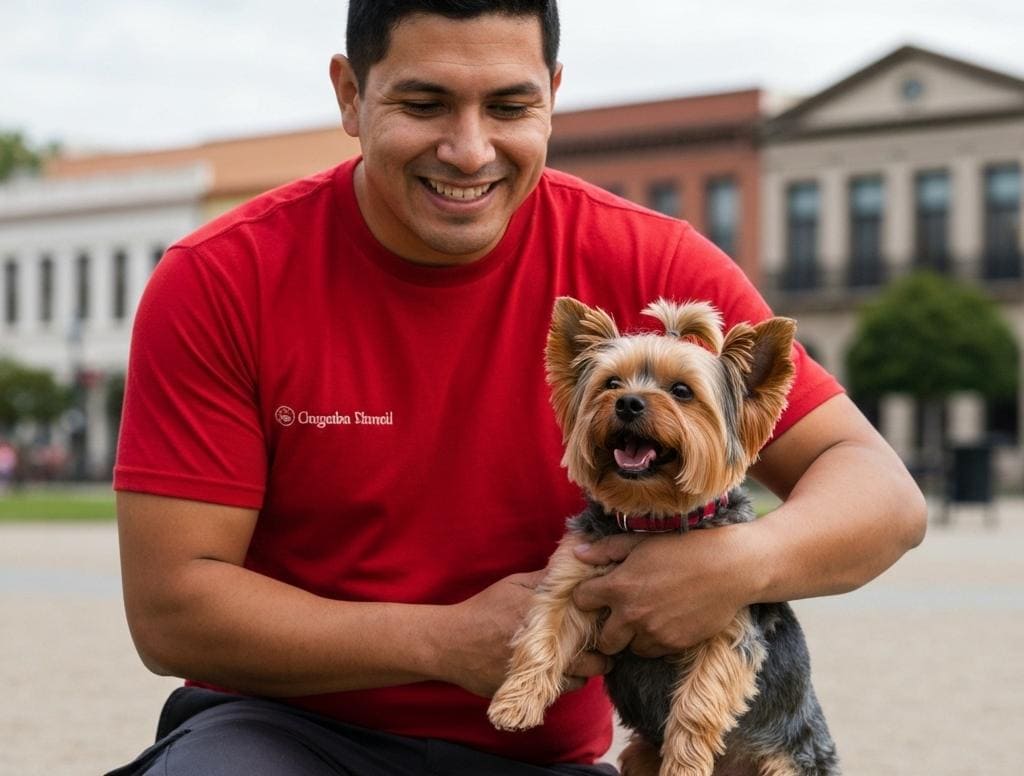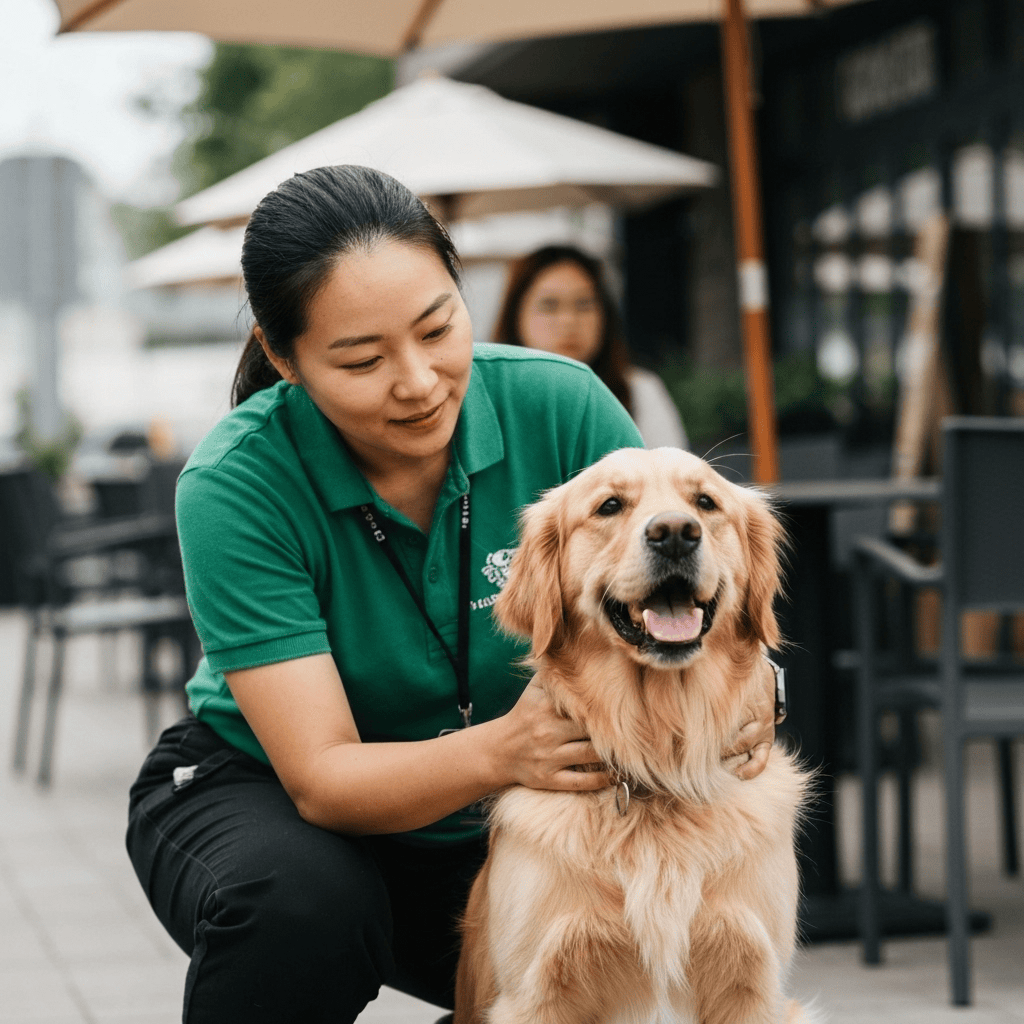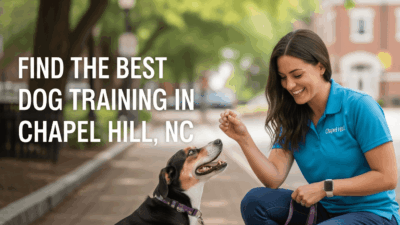Finding the Right Dog Trainer for Chapel Hill Living
When you’re walking your dog down Franklin Street or through the busy campus areas, you want to feel confident they can handle the crowds, sounds, and distractions. Chapel Hill offers wonderful spaces for dogs, from the greenways to the local dog parks, but your pup needs the right foundation to enjoy them safely.
Finding a good trainer here means looking for someone who understands what daily life looks like in our town. Your dog will encounter everything from college students rushing to class to busy weekend crowds at Weaver Street Market, and training should prepare them for these real situations.
What Makes a Good Dog Training Program
The best training programs focus on positive reinforcement – teaching your dog what you want them to do instead of just correcting mistakes. This approach builds confidence and creates a stronger bond between you and your dog, which makes everything else easier.
Look for trainers with solid credentials like CPDT-KA, KPA-CTP, or CBCC-KA certifications. These programs require ongoing education and demonstrate a commitment to staying current with training methods. You can learn more about what these certifications mean in this guide to dog trainer certifications.
A trainer who knows Chapel Hill will understand that your dog needs to be comfortable on narrow sidewalks near campus, calm around the frequent construction noise downtown, and well-socialized for our busy dog parks. They should also be familiar with local leash laws and know good spots to practice training at different levels of difficulty.
Training Options That Work for Chapel Hill Families

Puppy training sets the foundation for everything else your dog will learn. In Chapel Hill, this means early socialization with the sounds of campus life, practice with polite greetings (essential when walking through student-heavy areas), and solid housetraining habits that work in apartments or homes with small yards.
Basic obedience covers the essential skills every Chapel Hill dog needs. Good leash manners make walks enjoyable whether you’re heading to Southern Village or strolling through campus, and a reliable recall keeps your dog safe at the off-leash areas in our local parks.
For dogs who struggle with fear, reactivity, or aggression, behavior modification takes a slower, more careful approach. This often involves desensitization and counterconditioning – gradually helping your dog feel better about the things that currently worry or upset them.
Private lessons work well when you need a customized approach or want to work on specific issues at home. Many Chapel Hill families choose this option for housetraining young puppies or addressing barking issues in apartments where noise travels.
Group classes provide structured practice around other dogs and people, which is invaluable preparation for our busy local parks and events. The key is finding classes that progress at the right pace and don’t overwhelm your dog early on.
Understanding Local Rules and Requirements
Chapel Hill has clear leash laws that affect where and how you can train your dog. Dogs must be on leash in all public areas except designated off-leash spaces at dog parks. The Town of Chapel Hill Animal Control handles enforcement and can answer specific questions about local regulations.
North Carolina requires current rabies vaccination for all dogs over 4 months old, and you’ll need proof for most training classes and dog parks. NCDHHS Rabies provides statewide information about vaccination requirements.
Orange County doesn’t require general pet licensing, but rabies vaccination and tags are mandatory. Orange County Animal Services handles these requirements and offers community rabies clinics throughout the year.
Professional dog trainers in North Carolina aren’t required to hold state licenses, but reputable trainers carry liability insurance and pursue continuing education. Facilities that offer board and train services must comply with NCDA&CS Animal Welfare Section regulations for commercial kennels.
What You Can Expect to Pay
Training costs in Chapel Hill reflect both the local market and the level of expertise you’re seeking. Here’s what most families in our area pay for different types of training.
| Service Type | Typical Price in Chapel Hill | Nearby Triangle Average |
|---|---|---|
| Group classes 4 to 6 weeks | $160 – $300 | $150 – $300 |
| Private lessons 60-90 minutes | $110 – $185 per session | $100 – $180 |
| Puppy classes 4 to 6 weeks | $160 – $280 | $150 – $275 |
| Day training per week | $500 – $950 | $450 – $900 |
| Board and train 2 to 4 weeks | $2,000 – $4,200 total | $1,800 – $4,000 |
| Behavior consult initial | $140 – $250 | $130 – $250 |
Complex behavior issues like severe reactivity or separation anxiety typically cost more because they require specialized knowledge and longer training timelines. Most trainers offer package deals that reduce the per-session cost compared to paying individually.
Questions to Ask Before You Decide
When you’re evaluating potential trainers, these questions will help you find someone who’s a good fit for you and your dog:
- What training methods do you use, and how do you keep sessions positive for dogs?
- What certifications or continuing education do you have?
- How do you customize training plans for different dogs and families?
- Do you offer in-home sessions in my area, and are there additional travel fees?
- How do you measure progress and decide when to move to more challenging environments?
- What’s included in your packages, and what are your policies for cancellations or makeup sessions?
- Do you carry liability insurance?
- How much practice do you expect between sessions?
If you’re considering board and train programs, also ask how they meet North Carolina’s commercial kennel requirements and what their daily routine looks like for dogs in their care.
Great Local Spots for Training Practice
Chapel Hill offers excellent venues for different stages of training practice. Start with quieter locations and gradually work up to busier environments as your dog’s skills improve.
Homestead Park Dog Park provides fenced off-leash areas with separate spaces for large and small dogs, making it perfect for controlled socialization and recall practice.
Southern Community Park Dog Park on 15-501 South combines off-leash areas with nearby trails, so you can practice both off-leash skills and leash manners in the same trip.
Just outside Chapel Hill, the Carrboro Dog Park at Hank Anderson Community Park offers another option for safe off-leash practice.
Carolina North Forest provides miles of shaded trails where leashed dogs can practice focus and loose-leash walking around joggers, cyclists, and other trail users.
Many Chapel Hill residents also visit Duke Forest, where dogs are welcome on leash and the varied terrain offers good training opportunities.

Common Questions About Dog Training
How much does in-home dog training cost?
Most trainers in the Chapel Hill area charge $110 to $185 for 60 to 90-minute in-home sessions. Package deals typically bring the per-session cost down.
Is in-home dog training worth it?
In-home training can be very effective because trainers see your actual living situation and can address specific issues like doorbell reactivity or housetraining challenges in your space. It’s also convenient for busy families and dogs who get overwhelmed in group settings.
Can you pay someone to house train your dog?
Many trainers include housetraining support in puppy programs or day training services. Success depends heavily on consistency between training sessions, so you’ll still need to follow through with the plan at home.
What is the 3-3-3 rule for dog training?
This guideline suggests that new dogs need about 3 days to decompress from big changes, 3 weeks to learn your routine, and roughly 3 months to feel fully settled. It’s a helpful reminder to be patient, especially in the early stages.
How long will it take to reach my training goals?
Basic obedience skills typically take 4 to 8 weeks with consistent daily practice between sessions. Behavior modification for issues like reactivity or anxiety usually requires longer timelines and more gradual progress.
What should I bring to group classes?
You’ll need a flat collar or harness, a 6-foot leash (not retractable), high-value treats your dog loves, water, and proof of vaccinations if the trainer requests it.
What’s the leash law in Chapel Hill?
Dogs must be on leash in all public areas except designated off-leash spaces at dog parks. Chapel Hill Animal Control enforces these regulations and can answer specific questions.
Do I need a dog license in Chapel Hill or Orange County?
Orange County doesn’t require general pet licenses, but current rabies vaccination and tags are mandatory. Orange County Animal Services provides information about vaccination requirements and community rabies clinics.
What shots does my dog need in Orange County or North Carolina?
North Carolina requires current rabies vaccination for all dogs over 4 months old. Your veterinarian may recommend additional core vaccines like DA2PP based on your dog’s lifestyle and risk factors. See NCDHHS Rabies for complete state requirements.
Are dog trainers required to be licensed in Chapel Hill or Orange County or North Carolina?
North Carolina doesn’t require special licensing for dog trainers. However, facilities that house dogs for board and train programs must comply with commercial kennel regulations through the NCDA&CS Animal Welfare Section.
Where can I practice off-leash recall?
Fenced dog parks like Homestead Park Dog Park, Southern Community Park Dog Park, and Hank Anderson Community Park Dog Park provide safe spaces for recall training. For leashed areas, use a long training line until your dog’s recall is completely reliable.
Which dog parks allow training around Chapel Hill?
All the local dog parks welcome basic training as long as you follow posted rules and respect other park users. Avoid intensive training sessions during peak hours when the parks are crowded.
What beaches/trails allow dogs for training?
Chapel Hill doesn’t have beaches, but many local trails welcome leashed dogs. Carolina North Forest and Duke Forest are popular choices for leash training and focus exercises in natural settings.
Do trainers need insurance in Chapel Hill?
While not legally required for basic training services, professional trainers typically carry general liability insurance. Facilities with employees often add workers’ compensation and commercial auto coverage if they transport dogs.
What if my dog is reactive around other dogs?
Look for trainers experienced with behavior modification who use desensitization and counterconditioning techniques. They should also know good locations around Chapel Hill for practicing at appropriate distances and gradually building your dog’s confidence.
The right training approach, combined with consistent practice in Chapel Hill’s diverse environments, will help your dog become a confident, well-behaved companion who can enjoy everything our town has to offer.
